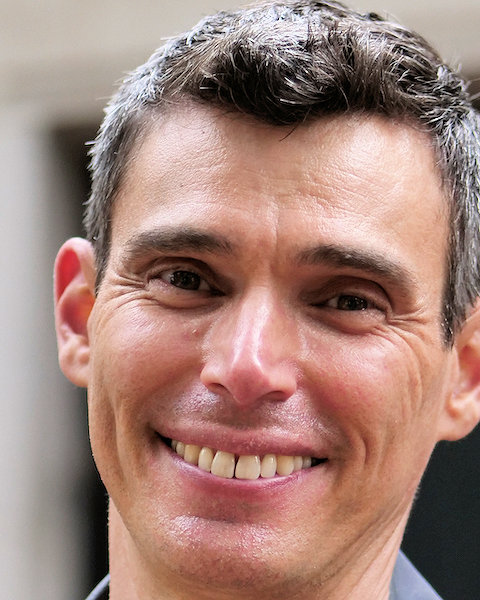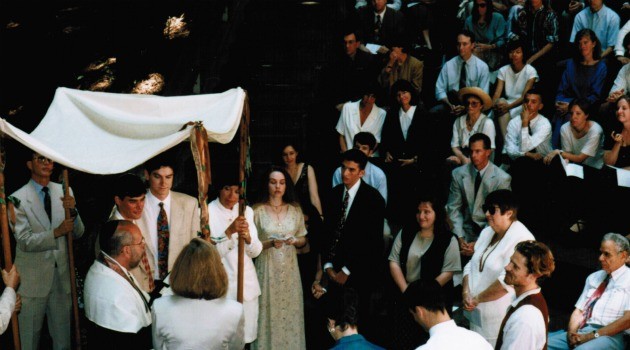
Dr. David Shneer
Biography
David Shneer, queer-Jewish scholar and activist, was born on April 6, 1972 in Los Angeles, California, to Diane and Jim Shneer. A prodigious child, he taught himself to read by age three. When he began formal education, his kindergarten teacher spotted his abilities and arranged for him to be placed in the third grade. David’s personality developed to become kind, generous and engaging alongside his advanced and often unconventional academic ability. He did university studies at University of California: Berkeley, earning a B.A. degree (1994) in history and Slavic languages, an M.A. (1996) and Ph.D. (2001) both in history.
Shneer’s Ph.D. thesis, expanded and published in 2004 as Yiddish and the Creation of Soviet Jewish Culture 1918-1930, explored the apex of Yiddish culture in the Soviet Union before the Stalinist purges of the late 1930s. Shneer noted in a 2010 interview that his grandparents were originally from Russia but were fully assimilated, “with no trace of a Yiddish accent in their English.” He believed that “Yiddish is never just Yiddish;" interest in Yiddish was a search for an alternative Judaism which was popular in Berkeley during his student years. Shneer was among the first scholars to gain access to the Soviet archives, most importantly, the archive of the Moscow Yiddish newspaper, Der Emes. This allowed him to bring new insights to this aspect of Soviet Jewish history.
Schneer’s deep appreciation for Yiddish led him to run a summer program at the Yiddish Book Center in Amherst, Massachusetts from 2005-2016. The Center’s founder and long-time director, Aaron Lansky, highly praised Schneer’s work there: “The students loved him. You get those reviews at the end, and they were just off the charts.”
Shneer’s gay activism also began during his Berkeley years. He served as the education director of Congregation Sha'ar Zahav, the LGBT synagogue in San Francisco from 1997 through 2001. In the summer of 2003, Shneer was one of the founders of Mosaic: The National Jewish Center for Sexual and Gender Diversity. As the first such national organization in the U.S., Mosaic’s purpose was stated as: “partners with Jewish organizations, communities, and individuals of every denomination to create a world where all Jews are fully included in Jewish communal life, regardless of sexual orientation or gender identity.” In 2010, Jewish Mosaic merged with another national organization, Keshet. Shneer served on the Keshet board of directors and as vice-chair for a time. In 2002, Shneer co-edited a book of essays, entitled Queer Jews, which describes how queer Jews are changing Jewish American culture, creating communities and making room for themselves, as openly, unapologetically queer and Jewish.
Shneer was the 2003-2004 Pearl Resnick Postdoctoral Fellow at the U.S. Holocaust Memorial Museum. His research project was entitled, “On the Frontlines: Soviet Jewish Photographers Confront World War II and the Holocaust.” During this and following years he studied the lives and works of two dozen Soviet Jewish World War II military photographers, examining what kinds of photographs they took when they encountered evidence of Nazi genocide on the Eastern Front. He published this as Through Soviet Jewish Eyes: Photography, War, and the Holocaust (2011), which won the 2013 Jordan Schnitzer Prize of the Association for Jewish Studies and was a finalist for the National Jewish Book Award. In fall 2011, the traveling museum exhibit “Through Soviet Jewish Eyes” debuted at the Colorado University Art Museum in Boulder, and then displayed at the Museum of Jewish Heritage in New York City, the Holocaust Museum Houston, the University of Louisiana's Museum of Art, and at the Illinois Holocaust Museum in Chicago.
Shneer began teaching at the University of Denver in 2001 and became the Director of the Center for Jewish Studies there in 2003. He moved to the University of Colorado in Boulder in 2008 where he served as Director of Jewish Studies until 2015. He became the Louis P. Singer Chair of Jewish History in 2012 and also served as Chair of the Department of Religious Studies from 2016-2019.
Shneer has lectured extensively nationally and internationally. Also a prolific writer, he has been published in numerous scholarly, cultural and popular publications. Most recently, he served as editor-in-chief of East European Jewish Affairs and on the editorial boards of Journal of Jewish Identities, the Association for Jewish Studies' magazine Perspectives, and for the book series Borderlines with Academic Studies press. He has served as consultant to numerous Jewish agencies on questions of contemporary Jewish identity, and on the board of directors of the Association for Jewish Studies.
Shneer blended astute scholarship with cultural reflection and social activism which drew many students to him for counsel and direction. He relished the role of mentor and guide for students and young scholars and was always accessible and attentive to their needs. His teaching typically drew high marks from his students.
Shneer’s wide-ranging passion for the arts and storytelling could lead to an innovative scholarly project. During a visit to Berlin, he met the German-Jewish singer and actress Jalda Rebling and learned about her mother, the Dutch-Yiddish singer and actress, Lin Jaldati. Jaldati survived the German concentration camps during the Holocaust and settled in East Berlin. There she became the Yiddish diva of the Communist world, touring with concerts of Yiddish songs and releasing several albums. In collaboration with singer-colleague Jewlia Eisenberg whom he met when they were Berkeley students, Shneer created a multimedia project, “Art Is My Weapon: The Radical Musical Life of Lin Jaldati.” This project tells Jaldati’s story through song, showing how she was instrumental in shaping Holocaust memory in East Germany until her death in 1988. Shneer impressed his scholarly colleagues by presenting his work through singing and storytelling as shown in the video below Shneer and Eisenberg performed in numerous synagogues and universities.
Shneer most recent work, Grief: The Biography of a Holocaust Photograph, describes the history of the world's first widely circulated Holocaust liberation photographs as they travel from the killing fields of southern Russia in 1942 to the white walls of the Museum of Modern Art in the 21st century. This was published by Oxford University Press in 2020.
Shneer married Gregg Drinkwater in a traditional chuppah ceremony in 1996. They co-parented daughter Sasha. Shneer struggled with the onset of brain cancer for several years before entering hospice care and completing his life journey on November 4, 2020.

(This biographical statement written by Mark Bowman from these sources: https://www.davidshneer.com/biography.html
https://www.jta.org/2020/11/10/united-states/david-shneer-beloved-professor-of-jewish-studies-dies-at-48
https://forward.com/culture/yiddish-culture/458167/david-shneer-professor-who-led-student-visits-to-prewar-yiddishland-dies/
https://www.ijn.com/prof-david-shneer-beloved-professor-passes/)
Biography Date: November 2020
Additional Resources
Hear David’s beautiful voice as a singer in this musical collaboration with Jewlia Eisenberg. He is singing Dem Milner's Trern (“The Miller’s Tears”) in Yiddish which is part of the "Art Is My Weapon" project. https://vimeo.com/233875586
Tags
Jewish (ethnic, Reform, Reconstructionist, Orthodox) | Author/editor | Activist (religious institutions) | Berkeley | California | Colorado | Artist/musician/poet | Jewish Mosaic | Keshet
Citation
“Dr. David Shneer | Profile”, LGBTQ Religious Archives Network, accessed February 12, 2026, https://lgbtqreligiousarchives.org/profiles/david-shneer.
Remembrances